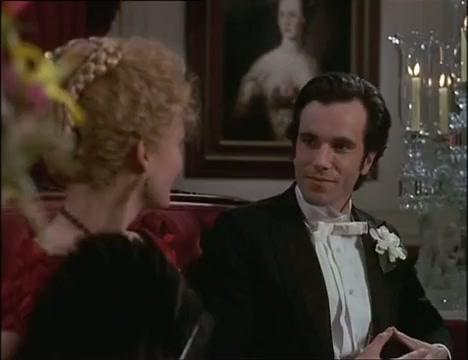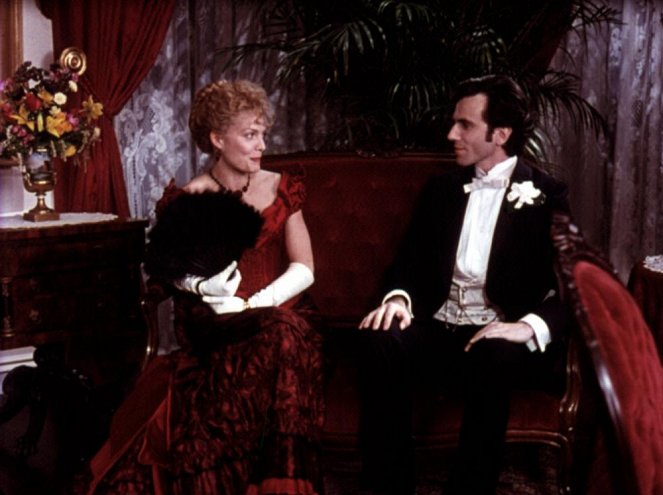Réalisation:
Martin ScorsesePhotographie:
Michael BallhausMusique:
Elmer BernsteinActeurs·trices:
Daniel Day-Lewis, Michelle Pfeiffer, Winona Ryder, Richard E. Grant, Alec McCowen, Geraldine Chaplin, Mary Beth Hurt, Stuart Wilson (plus)VOD (4)
Résumés(1)
Dans la haute société du New York de 1870, le jeune avocat Newland Archer annonce ses fiançailles avec l’héritière May Welland à la suite d’une soirée à l’opéra. Au même moment, il fait la rencontre de la comtesse Ellen Olenska, une cousine de May à la réputation sulfureuse qui veut divorcer de son mari. Newland est désigné par la famille de May pour raisonner la comtesse et éviter le scandale. Dans cette société qui étouffe la violence dans les soieries et corsette les passions, Newland et Ellen vont devoir lutter contre leurs sentiments naissants. (LaCinetek)
(plus)Vidéo (1)
Critiques (10)
Pour des raisons personnelles, je ne peux que mettre cinq étoiles. Même si Le Temps de l’innocence n’est plus tout à fait d’actualité pour moi, il reste globalement valable. Scorsese a filmé une œuvre intemporelle qui s’appuie sur le jeu remarquable de ses acteurs principaux. Daniel Day-Lewis garantit, à lui seul, la qualité du film, Winona Ryder est tout simplement parfaite dans son rôle et Michelle Pfeiffer complémente ce trio douloureux par une performance riche en émotions.
()
It is clear to me why this film from Martin Scorsese’s filmography is not talked about much. In terms of its story, The Age of Innocence is unbelievably boring, and the only thing that salvages it is the way Scorsese filmed it. Michelle Pfeiffer’s story might have been the most interesting thing in the whole movie. But that’s still not enough to turn this into a good film. Just imagine that the movie you’re watching is not set in New York but in the English countryside and the level of its blandness becomes clear. This movie aspired to give me a visual brain lobotomy.
()
The Pulitzer Prize-winning novel served as the template for a beautiful costume melodrama set in a time when morality was a priority above all else. The sweet times of booming New York are embellished by the actors' feel-good performances. Day-Lewis and Pfeiffer love each other more than their century can bear. And poor little Ryder has to face it all without giving anything away. The slow pace matches the time period shown, there is plenty of time for each visit to the salon or the opera, and there is only one thing to do - to be moved.
()
A historical costume melodrama about the unfulfilled love of two members of New York's high society in the second half of the 19th century. Although there are objections in the comments regarding its length and "emptiness and dullness," I personally don't think that the weakness of the film lies in the quality of the screenplay and its execution. In fact, such careful psychological characterization and well-thought-out story structure are certainly not often seen. Thanks to the budget and Scorsese's directorial skills, The Age of Innocence is a truly impressive depiction of the life of the bourgeois elite, starting with the ladies' wardrobe and ending with the grandeur of bourgeois residences. Yes, this film does not rush anywhere, and you must look for adventure, eroticism, or tension in other genres and titles. But this is not Scorsese's or his team's fault. My detachment and more modest evaluation are rather of an "ideological" nature. I simply don't feel well among those chatty snobs, hypocrites, and manipulators. I have no sympathy for the central couple either, who ultimately decided their own fate. If you decide to sell yourself for a noble title and meet the expectations of your family and social conventions, you must also sacrifice something, at least personal freedom and emotional fulfillment. They both had a choice, no doubt about it, but they couldn't overcome the limits of their social class. They sold themselves, and it apparently didn't hurt Newland much. Scorsese looks at his calculating bourgeois characters with a kind understanding rather than stabbing and biting, as social-critical authors would. In his interpretation, it is more of a romantic story of unhappy love than a social drama about period-class morality. I would gladly watch this story again but in the style of Guy de Maupassant... Overall impression: 65%.
()
“I want, and I can’t.” More than two hours of filmmaking elegance at a level that few directors manage to achieve. I didn’t get the impression that the plot was conventional and that only the rendering of it was extraordinary. Both aspects are beyond the average and both logically complement Scorsese’s filmography. Though The Age of Innocence is actually another one of his films about violence and organised crime, the violence and crimes in it are hidden, unmanifested. The rules of behaviour are determined by clans, though not mafia clans in this case, but familial clans. Those who do not want to lose their prestige, as if anything else mattered, must not mention that fact, nor can they even think it. The characters harm themselves with words, or rather by avoiding words. As in the book on which the film is based, their true intentions and repressed desires are revealed to us by an honest narrator, a physically absent yet omnipresent guide to the now so distant world of the New York upper crust in the late 19th century. The narrator says what the characters dare not say. Together with the setting, she speaks for the silent protagonists (I had assumed that sophisticated work with colour, props and blocking had gone extinct along with classic Hollywood – fortunately that is not the case). In the diegetic world, Countess Olenska takes on the role of a woman who does not intend to conceal the state of things as she has come to recognise it. She does not want to be another victim of social conventions, another obedient, loving wife. However, she doesn’t have immunity to protect her from the impact of her frankness. The power to save her belongs to Newland, who is consumed from within by the necessity of choosing between a woman who speaks the truth and a woman who says only what is appropriate. Thanks to the narrator, the (post-)modern narrative techniques (letters read to the camera, the director’s self-reflexive cameo as a photographer, the one who records the lives of the characters) and the careful guidance of our attention (through music, making words visible and the moderate use of close-ups and “archaic” curtains), we clearly and comprehensibly learn more about the characters than the period and setting in which they lived allowed them to learn about themselves. More than relationship dramas that focus primarily on the surface without looking beneath it, The Age of Innocence rewards us for the attention that we give it. And it does so without losing any of the emotional power of the story about the violence that we still commit every day. We just don’t talk about it so openly anymore. Of Martin Scorsese’s films, I currently consider this one to be his best. 90%
()



Annonces